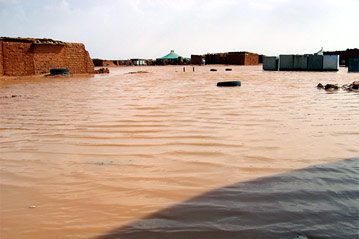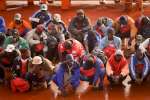- Text size
 |
|  |
|  |
| 
- Français
UNHCR airlift delivers vital aid to flood-stricken Tindouf camps
News Stories, 20 February 2006

TINDOUF, Algeria, Feb. 21 (UNHCR) – A UNHCR airlift supported by Portugal and Italy entered its third day Monday, delivering tonnes of urgently needed tents and other relief items to tens of thousands of Sahrawi refugees made homeless by severe floods in western Algeria.
The first two flights over the weekend by Italian and Portuguese Air Force C-130 cargo planes delivered 440 lightweight tents from UNHCR's regional warehouse in Jordan to Tindouf and Oran in western Algeria. The tents, weighing some 20 tonnes, were then transported by Algerian trucks to the flood-hit camps. UNHCR teams began distribution of the family-size tents on Monday. Algerian authorities also provided tents, which were distributed earlier.
"These flights are essential to help us bring over 200 tonnes of relief items to the camps," said Radhouane Nouicer, UNHCR's Geneva-based regional deputy director who just returned from Tindouf. "We continue to appeal for additional air and financial support to help as many of the affected Sahrawi refugees as quickly as possible."
More than 25 flights will be needed to airlift all of the supplies, including more than 2,000 lightweight tents, plus tens of thousands of blankets, mattresses, plastic sheets and jerry cans.
The European Commission's Humanitarian Aid Office (ECHO) is providing 500,000 to help supply tents, blankets and sheets to the affected population. ECHO has been a major donor of assistance to Sahrawi refugees for some years.
Nouicer was among several UNHCR and World Food Programme (WFP) officials as well as donor representatives who visited the devastated camps over the weekend. The team visited two of the most affected camps, Awserd and Smara, as well as two damaged boarding schools.
"We saw significant destruction," Nouicer said. "What is worse is that many of the damaged houses will most probably collapse as soon as the mud dries."
More than half of the houses in Awserd, Smara and Laayoune camps were destroyed by the floodwaters, and 25 percent were badly damaged. The camp infrastructure also suffered enormous damage, including collapsed community buildings. None of the health clinics can be used. Hospitals were also badly damaged, including pharmacies and medical equipment. All schools were destroyed in the three affected camps.
UNHCR, UNICEF and WFP are cooperating closely with local agencies and officials to provide relief.
Last week, UNHCR deployed an emergency coordinator and a water and sanitation expert. In addition to immediate emergency support, UNHCR will focus on the rehabilitation and reconstruction of vital camp infrastructure, including schools, medical clinics, centres for the disabled, and water and sanitation systems.
While the Tindouf region has experienced smaller floods in the past, the recent flooding is the worst to hit the area since 1994, when UNHCR had to relocate all of Awserd camp to higher ground.
Sahrawi refugees started arriving in Algeria in 1976 after Spain withdrew from the Western Sahara and fighting broke out over its control. Most of the Sahrawi refugees have been living for more than 30 years in the desert regions of western Algeria, totally dependent on outside assistance. UNHCR is currently supporting 90,000 of the most vulnerable refugees.
































